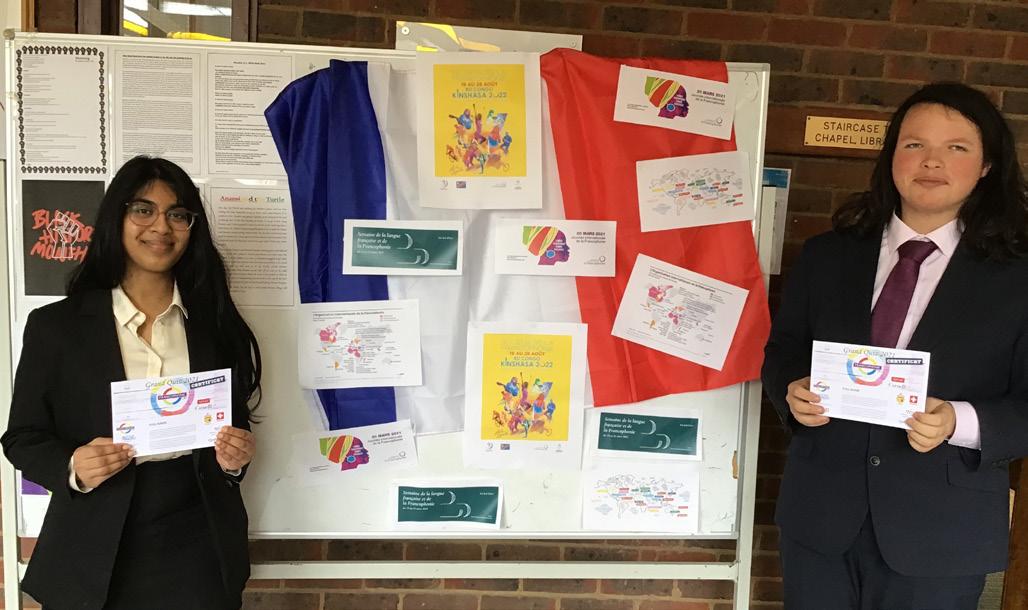
6 minute read
The Department of French
from The Olavian - 2021
by saintolaves
Whenwe started the new academic year in September 2021, we all had to adapt to different zones and classrooms as teachers were moving while students were staying in their zones. This situation presented its challenges but little did we know how long Covid would prevent us from returning to “normal”, which for a foreign language is particularly critical.
While several planned outings were simply cancelled until the end of the academic year, the French Department continued to ensure the best outcome for our students, as you can see below from the opportunities given to them online. Preparation had been made for the usual residential visits to Paris with Sixt formers and Normandy for Year 10s as well as maintaining the Year 9 exchange. These plans have been carried forward to 2022.
Advertisement
To this effect, we took the opportunity of a slot in Activities Week 2 for Year 10 students to take part in a television treasure hunt entirely in French, with the help of a map of Normandy and visual clues in order to bring Normandy to them! Pity St Olave’s does not yet have a helicopter pad for the contestants! In the same vein, on the 14th July, the Year 8 classes studying French watched a documentary on the French Revolution, prepared a short piece of research on life conditions at the time of the revolution and were asked to write a page in the diary of a peasant or an aristocrat, in target language, to commemorate Bastille Day on the appropriate day. No guillotines were involved! During that week, Year 7 students enjoyed a project on Asterix, including an Asterix- themed escape room, a presentation by Mr Carroll on historical context and the creation of a page of comics, with French captions, given the enthusiasm of French people for this genre.
After joining the French Department and the freshly reinstated Spanish Department in September 2020 in such challenging circumstances, Miss Itzaskun OlaldeScott left in July 2021 to get married to her German fiancé. Dr Pickett and Ms Napier subsequently joined us in September.
The French Department is looking forward to being able to travel across the Channel again soon in order to challenge, enrich and engage further our students in the study of this beautiful language.
Isabelle Saunders Head of French
Joutes Oratoires Lycéennes
The Institut français and Francophonie UK presented the national final of the Joutes Oratoires Lycéennes, concluding months of French debating competitions, involving hundreds of Sixth Form students from across the UK. Year 12 and 13 students studying French took part in a workshop organised by the Institut français, and this led to five brave Year 12 students going head to head with teams from some of the most prestigious schools in the country in the qualifying rounds of the Joutes Oratoires, a national French debating competition. The national competition takes place every year and this is the first time St. Olave’s has taken part. Our three teams acquitted themselves brilliantly, all the more so for having had very little time to prepare arguments for and against the motions: En période de crise sanitaire, les gouvernements doivent avoir toute latitude de restreindre les libertés individuelles. (In a pandemic, governments should be free to curtail civil liberties.); L’intelligence artificielle est une menace pour l’humanité. (Artificial intelligence is a threat to humanity.); La croissance verte est un leurre. (Green growth is a dangerous illusion.)
The team each debated entirely in French, against Sevenoaks School, Tiffin School, Hampton School, and The Grey Coat Hospital. Congratulations to Shruti Thatikonda and Viraj Seelam who beat the team from Eton under the eyes of an adjudicator from the Swiss Embassy. Griffin Keemer deserves a special mention for being a ‘team’ all on his own against standard teams of two students. Our fierce French debaters are hoping to sharpen their skills by running their own society at St. Olave’s.
La Semaine de la Francophonie
To celebrate this annual event, the French Department organised a week of different lesson contents based on the French-speaking world. Year 10 translated poetry and experienced an escape room using the imperative mood, Years 7 and 9 worked on a project on a country of their choice using the future tense, Year 7 focussed on sports in French-speaking countries.
French Prefects, Shruti and Griffin, contributed slides on French speaking countries and the Académie Française as part of a presentation circulated to all Form Tutors, with Kahoot quizzes for tutor groups as a follow on. Pupils and members of staff from across the school (teaching and non-teaching) were invited to test their level of written French in the traditional shape of a ‘dictée’ (French dictation). This is how children throughout France have always practised their accuracy and is part of everyone’s school memories. Thanks to Mr Harris in the canteen, a French menu was offered mid-week and thanks to Dr Sidhu, some insight into the French-speaking world was made available on the school’s public screens. It was also possible to take part in the Grand Quiz organised by the High Commission of Canada in the UK. la vie des populations du monde entier. Parmi les 17 objectifs, ils visent à éradiquer la faim, la pauvreté et les inégalités entre les sexes dans le monde, ainsi qu’à lutter contre le changement climatique, promouvoir la justice et un accès généralisé à l’eau et à l’assainissement. En fait, leur 17e objectif est un partenariat mondial pour rendre les objectifs réalisables. Alors que les dégâts de la récente pandémie aggravent les cicatrices inégalités, insécurité alimentaire et tensions politiques, il est clair que la nécessité pour les pays de travailler ensemble pour atteindre ces objectifs vitaux est d’une importance sans précédent.
Lancaster University MFL Prize 2021
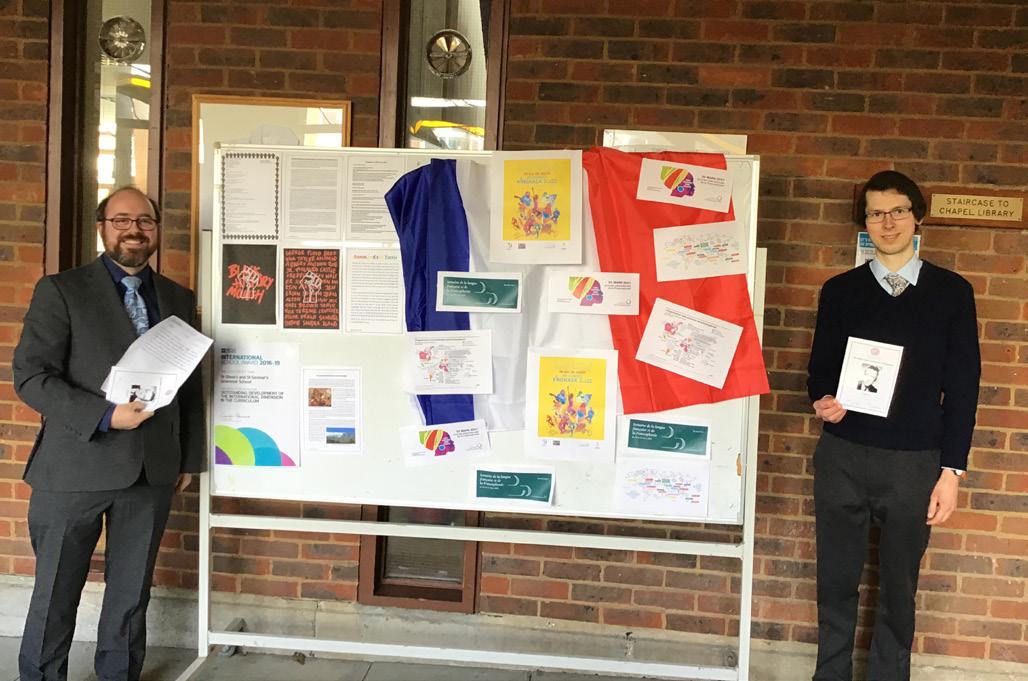
Shruti Thatikonda’s essay was selected internally among other submissions from Year 12 students on the following topic: ‘To what extent do languages facilitate inclusivity in the modern world?’ Only one essay per school per language could be submitted. Together with being one of the MFL prefects, Shruti is waiting to hear form her interview at Cambridge University to read French and Russian ab initio.
‘Le pas le plus notable vers l’internationalisme tel que nous le connaissons aujourd’hui est venu du président Américain Woodrowe Wilson qui, après avoir vu les horreurs de la première guerre mondiale, a créé la Ligue des Nations où les pays pouvaient régler leurs différends par la voie diplomatique au lieu de sur un champ de bataille. Bien que différentes cultures se mélangent plus que jamais, le renouveau troublant des attitudes xénophobes appelle un besoin accru de reconnaître notre humanité commune.
Le pouvoir collectif des pays leur donne plus de portée et de pouvoir que des pays singuliers dont le pouvoir peut être exploité pour une grande amélioration humanitaire. Des objectifs de développement durable ont été fixés par les Nations Unies, à atteindre d’ici 2030, pour améliorer
Au 21e siecle nous avons une crise de réfugiés. À la fin de 2019, 79,5 millions de personnes ont été déplacées de force et 1% de la population mondiale a fui ses foyers à la suite d’un conflit ou de persécutions. Malheureusement, les sentiments xénophobiques et anti-immigrés augmentent dans le monde, conduisant à des frontières plus strictes. Le taux moyen d’octroi de l’asile en Europe est de 63 à 65%, mais pour les Britanniques, il n’est que de 28% en 2017. Dans des moments comme ceux-ci, nous devons transcender les frontières arbitraires entre les nations et accueillir ceux qui sont en danger. Nulle part l’importance de la coopération internationale n’est plus visible que dans les percées que la communauté scientifique a réalisées ces derniers temps. Depuis la Seconde Guerre mondiale, la coopération scientifique s’est développée régulièrement au-delà des frontières nationales. L’Agence spatiale européenne fondée en 1975 et avec 22 États membres effectue un travail d’une importance cruciale, comme l’utilisation de satellites pour mesurer les changements du niveau de la mer, l’épaisseur de la glace de mer et la vitesse de déplacement calottes glaciaires pour étudier le changement climatique, peutêtre le plus grand danger pour la civilisation humaine en les temps modernes. Pour conclure, l’internationalisme est peut-être plus important aujourd’hui qu’il ne l’a jamais été. La communauté internationale doit unir ses efforts pour combler le fossé vers un avenir plus heureux, plus sûr et plus prospère ensemble, grâce à l’aide humanitaire et au progrès scientifique. Avec la collaboration, nous pouvons surmonter les différences entre nos cultures diverses et riches et favoriser une plus grande tolérance et acceptation les uns envers les autres.’
Cinema trip
On Friday 28th May, several Year 12 French students went to the Lumière cinema, behind the Lycée français, in South Kensington to watch a film entitled ‘De Gaulle’ closely linked to ‘Au revoir les enfants’ which is studied as part of the French A Level syllabus.
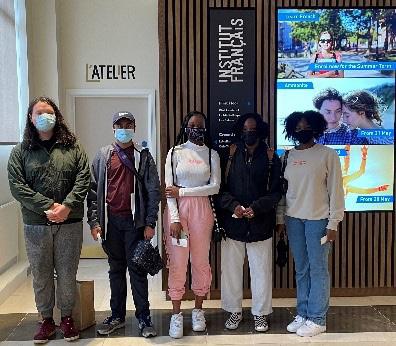
Produced in 2019 and directed by Gabriel Le Bomin, the film was nominated for the French César Awards 3 times. Set at the beginning of WWII, mixing the historic and the Romanesque, it illustrates the military debacle as well as the revelation of a destiny. It was an excellent way for our students to understand better the historic background to our film.
Students’ work
While working from home and inspired by the new school website, 7B students were asked to produce their own webpage for St Olave’s in order to consolidate their knowledge of French school life and related vocabulary. The look of these webpages are in close competition with our official website!

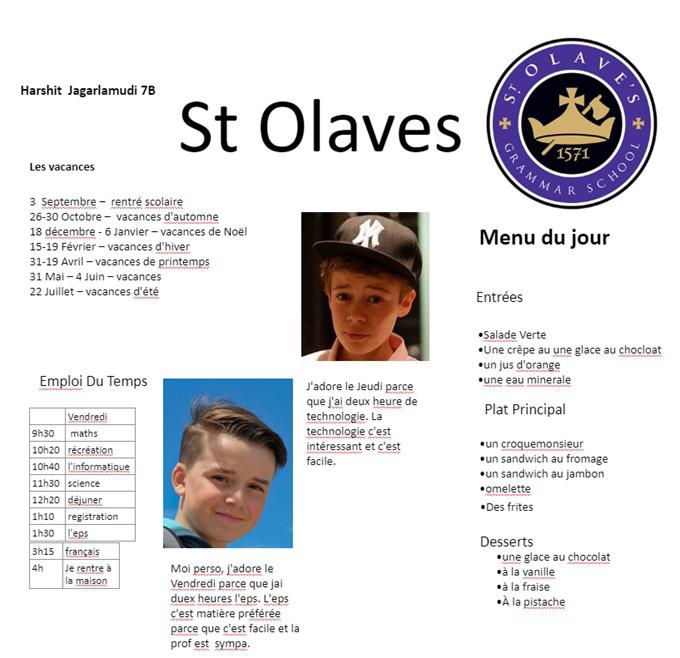
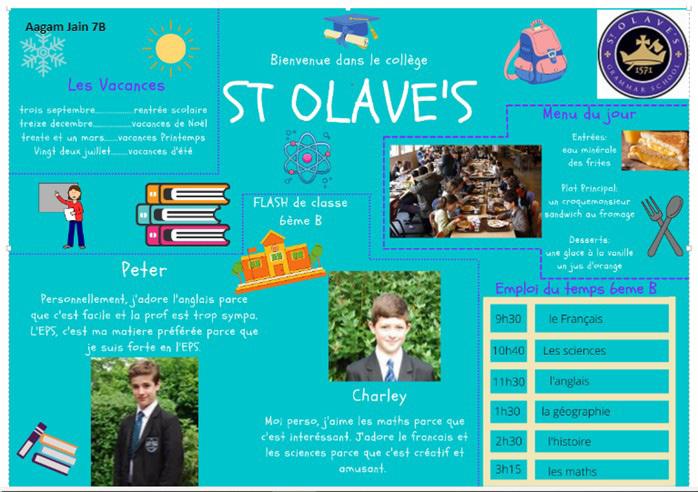
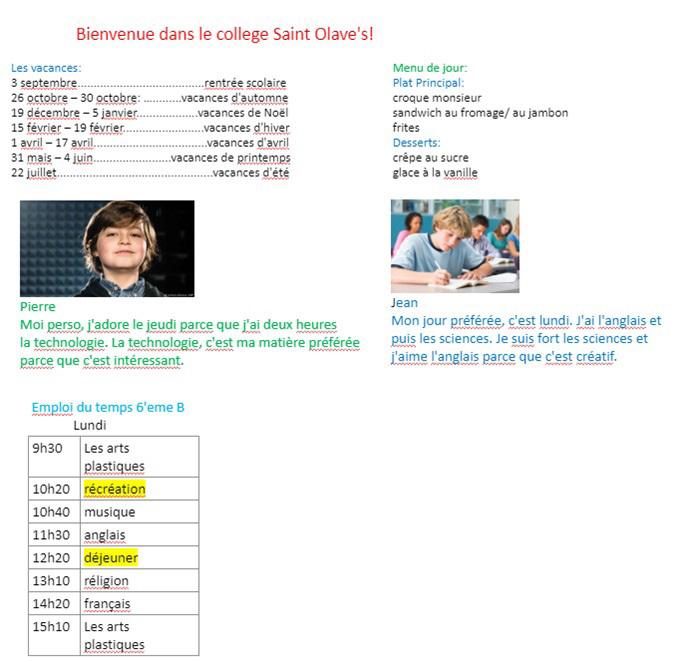
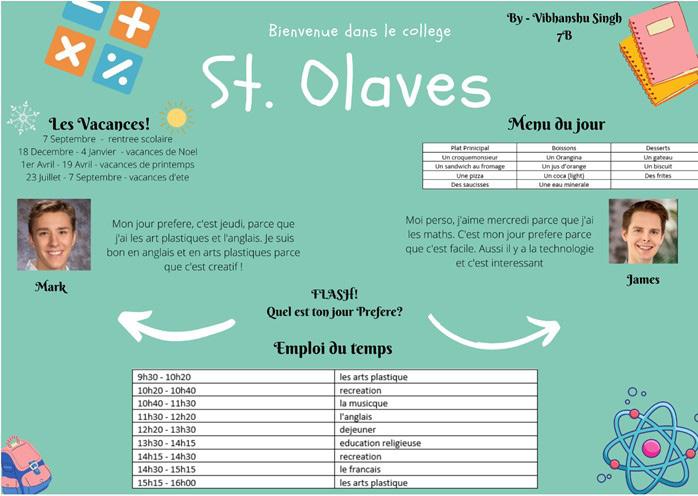
UK Linguistics Olympiad
A number of Year 12 students who sat the UK Linguistics Olympiad have been recognised with Bronze and Silver Award Certificates. Matthew Todorov, Elise Stringfellow, William Boyd, and Wren Welfare received Silver Award certificates and Abdul-Rahman Muazu, Anupam Bandi, Derin Burke, Kiran Pearce, and Ritvick Sharma received Bronze Award certificates. The students thoroughly enjoyed the challenging paper - Frank Shrimpton was so inspired by the questions on Native American Indian languages that he researched these further and presented his findings to the Modern Foreign Languages Society.










